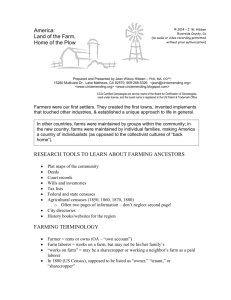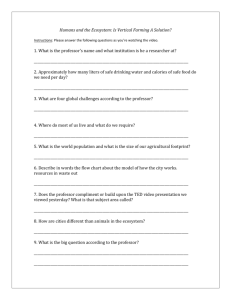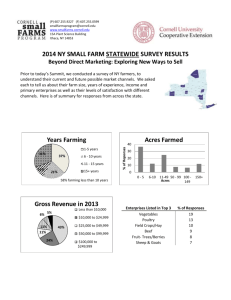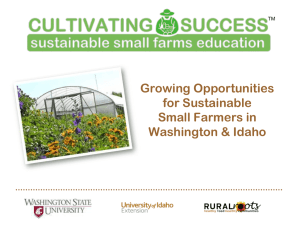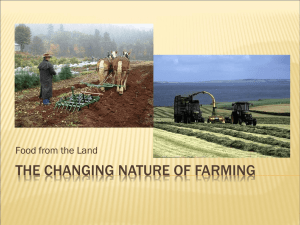3rd Annual Agricultural Summit - Jay Lehr
advertisement
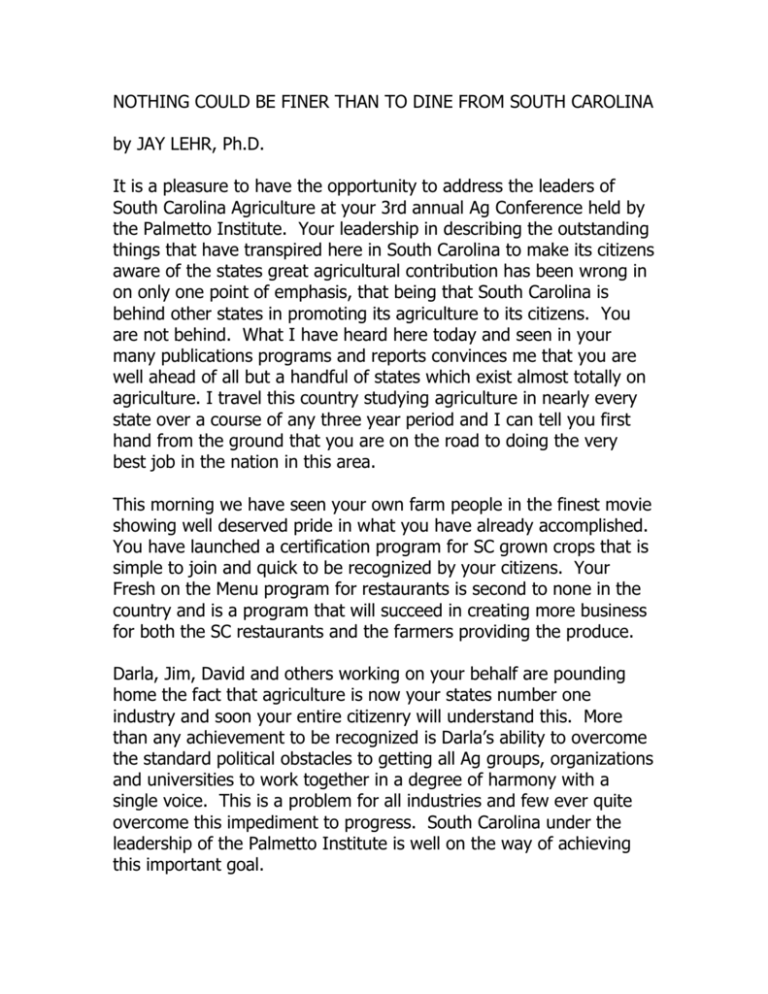
NOTHING COULD BE FINER THAN TO DINE FROM SOUTH CAROLINA by JAY LEHR, Ph.D. It is a pleasure to have the opportunity to address the leaders of South Carolina Agriculture at your 3rd annual Ag Conference held by the Palmetto Institute. Your leadership in describing the outstanding things that have transpired here in South Carolina to make its citizens aware of the states great agricultural contribution has been wrong in on only one point of emphasis, that being that South Carolina is behind other states in promoting its agriculture to its citizens. You are not behind. What I have heard here today and seen in your many publications programs and reports convinces me that you are well ahead of all but a handful of states which exist almost totally on agriculture. I travel this country studying agriculture in nearly every state over a course of any three year period and I can tell you first hand from the ground that you are on the road to doing the very best job in the nation in this area. This morning we have seen your own farm people in the finest movie showing well deserved pride in what you have already accomplished. You have launched a certification program for SC grown crops that is simple to join and quick to be recognized by your citizens. Your Fresh on the Menu program for restaurants is second to none in the country and is a program that will succeed in creating more business for both the SC restaurants and the farmers providing the produce. Darla, Jim, David and others working on your behalf are pounding home the fact that agriculture is now your states number one industry and soon your entire citizenry will understand this. More than any achievement to be recognized is Darla’s ability to overcome the standard political obstacles to getting all Ag groups, organizations and universities to work together in a degree of harmony with a single voice. This is a problem for all industries and few ever quite overcome this impediment to progress. South Carolina under the leadership of the Palmetto Institute is well on the way of achieving this important goal. It is after all ridiculous that only 6% of the crops harvested in this state are actually eaten in this state. Why would anyone import food from California, literally the land of Fruits and Nuts, when they could eat locally and save the nation a lot of fuel and environmental impact? Why should people demand the very same foodstuffs 12 months a year when by focusing on the seasonal availability of South Carolina’s wide variety of food they could enjoy a varied menu from their own state 12 months a year. Additionally how can a state which is one of the larger shrimp producers have to carry them to Alabama for processing and end up eating shrimp from out of state? These are the dilemmas faced by your state which I believe will eventually be corrected by the new awareness program now being promoted through the many groups representing Ag in SC. To fully gain the support of your entire state toward agriculture the citizens, through you the leadership, must learn the truths about the American farm today. It is not the corporate entity the media preaches but instead is the same old family farm of yesterday with more modern technology. 99% of our farms are family owned. 90% are individual families, 6% are family partnerships and 3% are family corporations but only 1% are absentee corporate owned. These are big, producing 6% of the nation’s agricultural product, but that leaves 94% still produced on the family farm. And we are not losing farms anymore, not since 1975, when farms numbers had reduced to 2,225.000 farms from a high of 6.8 million farms in 1935. Since 1975 numbers have gone up and down a few thousands, now sitting at 2.1 million farms. Certainly about 15% are quite large producing some 85% of our output and 85% are small collectively producing the other 15%, but they are just as important as they produce the finest children in America and allow for the widest array of agriculture infra structure across the nation that the 350,000 more productive farms could not support. And these 1,750,000 smaller farms are not hobby farms. Though they nearly always have outside income from jobs in town, every one of them would like to farm full time if they could and maybe many will one day. But there off farm income allows them to be able to afford the finest farming equipment which more and more is now including precision equipment like tractors steered by global positioning systems which cover the ground more precisely and allow for variable rate inputs of seeds and fertilizer and herbicides to match the variability of the soil on a farm which therefore increases yields and decreases input costs. Such equipment can be purchased in total for under $20,000 and paid for by increased yields in as little as three years. In addition this high technology of precision agriculture will attract more young people to stay in farming. Those young people will serve as the techno experts for the forward thinking parents right now. South Carolinians also need to be educated to the fact that Corporate Farms are few and far between and are only promoted by the media to disparage the entire agricultural industry today. Similarly the public needs to understand that there are no Factory farms a term invented by environmental zealots and animal activists to disparage animal husbandry by making people believe that those of us that raise, dairy cows, hogs, chickens or cattle do so in an inhumane manner. Common sense tells you that you can not mistreat any animal and hope it will yield the most milk, eggs or lean meat. We really need to treat our livestock better than our children to make a profit from them, but the public is duped by the anti-agriculture zealots. If you, the leaders in agriculture, the farmers of South Carolina do not make any effort to correct the many negative myths about agriculture who do you think is going to do it for you? We have a similar major problem with South Carolina’s tremendous Forestry industry, an important part of agriculture. Most of this state’s citizens think we should save every tree. They have little idea that trees are a cash crop and that we plant far more each year than we harvest. How many of you have shared that fact with your neighbors? And I do mean neighbors. In case you think because you live in a small rural farming community that everyone in town, including those not in production agriculture understand farming, you are in for quite a surprise. Where do you think the corner druggist gets his information about agriculture? I can tell you with considerable certainty that it is not from you, because you do not talk farming with non farmers. No, the druggist gets his information like most people in town from the radio, TV, newspaper or magazine, which generally have it all wrong. Its time to deliver on a regular basis five messages to our family friends and neighbors: first of all eliminate their worries about our farm inputs being scary toxic chemicals. They need to understand that nitrogen, phosphate and potassium are natural elements we mine from the earth and the air and they are to plants what protein, carbohydrate and fat are to the human. they need to know that herbicides and insecticides are plant medicines to protect there health from disease carrying insects and to protect their nutrition from nutrient stealing weeds. Second they must understand we simply recycle N,P and K back into the soil after it goes to market with the crops we harvest, third they most know that without high yield farming we can not feed the world. While organic farming may provide high priced food for an affluent few its yields could never sustain the earth’s population with the nutrition it needs. Fourth we must explain to the public that farmers are the best land conservationists, for without our advances that tripled yields on nearly every acre in the nation, we would have had to plow down parks and soccer fields and golf courses to produce the food we need today. Finally we need to prove that we are the best environmental stewards on the planet. This country celebrates Earth Day on April 22 each year. For the farmer everyday is earth day. We raise our children on the farm, they drink the water from a well, breathe the air, conserve the soil, reduce run off, increase infiltration and everything that enables us to grow the largest and healthiest crops in the world. It is a story I love to tell and one that each of you must learn to tell as well. Another problem we must get out in front of is the concept of Sustainability in Agriculture. You know and I know that we have been farming here for over a century with no damage to the environment or our natural resources, so we must be farming sustainably, but it is not enough to know it, we must brag about it so the public will understand. Now the first problem is that few people really understand what the vague word sustainable means, so I will tell you and you must not forget it. I use the acronym SEARCH to remember the six characteristics of sustainability in farming. The S stands for Sensitive environments, which means that our farms do not harm surface waters or wetlands or areas of that nature. The E stand for energy and means that we make every effort to use as little as possible, that should go with out saying but we must in fact say it. The A stands for the Air, water and soil that we wish to protect, minimizing dust and fumes into the area, not allowing our inputs to run off the land into surface water and not allowing the soil to erode. In fact the advances in reduced tillage farming has dramatically reduced previous emissions of dust and fuel fumes into the air, all but eliminated the runoff of our chemical inputs and truly eliminated any soil erosion. The R in search stand for our efforts to recycle, reuse and reduce the use of all resources on the farm. It is all common sense to us, but we must talk about it. The C in SEARCH stands for our chemical inputs and stands for our efforts to reduce their use to a minimum, something that all farmers do because of high input costs, but the public does not know this. Tell them. And finally the H stands for the health of the people who work on a farm and our effort to protect it. Since who ever works on a farm they are working side by side with the family that owns the farm it goes without saying that we make every effort to protect their health, but say it anyway. Some bright spots for all of us in agriculture today is the increase in farm exports. The global demand for our food products will not decline as a growing affluent community around the world wants better food for their children than they had. The US is still best farming nation. Our dollar remains attractively low in value and exports will thus continue to grow. We will also be helped by greater and greater use of bio-diesel fuel in the country spurred by the military’s desire to be able to fuel all their ships planes and tanks with home grown fuel not dependent on unfriendly foreign countries. South Carolina’s soy bean crushing industry will prosper as a result. The greatest advance in agriculture for us all will come through biotechnology where seeds will deliver ever increasing yields and require ever decreasing chemical inputs to enhance nutrition and reduce disease. Simultaneously congressional support for agriculture will continue strong as indicated in the most recent farm bill. Support levels are fair and not likely to be needed. Money for research and environmental protection has been increased, and the only folks who may one day suffer are the very rich who have been able to game the farm bill with undeserved subsidies may now see this largesse end. Concurrently we need to broadcast how, amidst growth in farming, our environment continues to improve, something the fearmongering media never seems to want to talk about . Keep these ten facts from a 2003 USEPA report in mind about our progress in the past 30 years. 1 -The number of swimmable and fishable lakes and rivers has doubled. 2 - Smog declined by one-third as the number of cars has doubled. 3 - Acid rain declined by two-thirds as coal energy doubled. 4 - Toxic emissions from industry fell by half. 5 - Water consumption declined by 10 %. 6 - Wooded acreage increased significantly. 7 - Fewer than 5 animal species went extinct. 8 - Wetland losses declined by 80%. 9 - 94% of all water supplies meet USEPA standards. 10 - Recycling and composting of municipal solid waste increased tenfold. Finally while we are going to see some more bad news economically, our system will work over time. The future for agriculture in the long term has never been brighter. Our system is the best in the world. This country will be living better in 10 years from now than it is now, and in 20 years it will be better than it was 10 years before that. The ingredients that made this country the wonder of the world remain. Consider that in the past century we had a seven fold improvement in the average American’s standard of living. During that century we had the Great Depression, we had two world wars, we had a world wide flu epidemic, and we had the oil shock of the seventies. We had all these terrible things but somehow the American system unleashed more of human kinds potential enabling us to to improve our condition seven fold in spite of those massive set backs. Today’s malaise is small by comparison, so take it to the bank once again, that the future of South Carolina’s agriculture has never been brighter as long as each and every one of you plays your role in making it so. Become an advocate, a spokesperson not a spectator. Thank you. Jay Lehr
